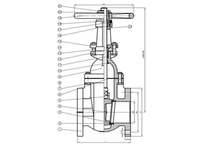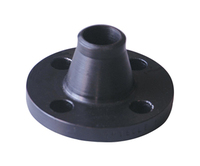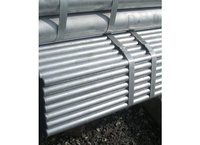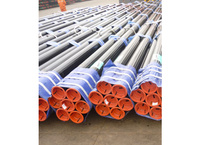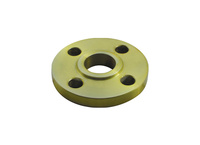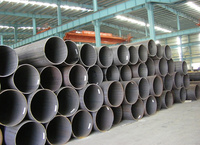ZMIO-A1 O.S.&Y. Flanged Gate Valves
Specifications
The rising gate valve is also referred to as a lifting stem gate valve, which is up and down together during the opening and closing process. The handwheel drives the valve stem nut to rotate, and
the nut is rotated to drive the valve rod up and down. The valve stem is not turned. There is a groove on the side of the gate, and there is a guide boss on the inner wall of the valve body, both
of which are engaged, and the gate is active. The gate is connected to the end T-head of the stem.
ZMIO-A1 O.S.&Y. Flanged Gate Valves Dimensions
O.S.&Y. Flanged Gate Valves VS NRS
1. Material (Similarity):
The body material of NRS and os & y gate valve flange type can be CI/DI/WCB/SS, compared the weight, the same size O.S.&Y. gate valve is heavier that NRS gate valve
2. Pressure (Similarity):
For iron body gate valve, both O.S.&Y. and NRS gate valves can be Class125/150, PN10/16,5K/10K/16K
3. Range of Applications:
O.S.&Y. Flanged Gate Valves are suitable for water, oil, gas, steam, and another environment, the stem is exposed,more corrosion resistance.
4. Installation (Similarity and Difference):
O.S.&Y. Flanged Gate Valves are high,suitable for underground pipe installation.According to the movement direction and position of the valve stem, the opening and closing and position of the
wedge can be intuitively judged.But it requires a large installation space.
ZMIO-A1 O.S.&Y. Flanged Gate Valves FAQs
1. What Are the Differences Between Rising Stem Gate Valves and Non Rising Stem Gate Valves?
(1). Screw rod can be seen on the rising stem gate valve but we can not see the screw rod on the non rising stem gate valve.
(2). The drive thread of the non rising stem gate valve is located inside of the valve body. During the opening and closing process, the valve stem only rotates and the wedge moves up and down in
the valve body. The stem of the rising stem gate valve drives the wedge up and down together. The transmission thread is outside the valve body. The opening/closing or position of the gate can be
intuitively judged according to the movement direction and position of the valve stem.
(3). The height of the non rising stem gate valve is small. The rising stem gate valve requires a larger installation space.
2. How Does a Non-rising Stem Gate Valve Work?
For non-rising wcb gate valves, the threads on the stem remain inside the valve body. The valve gate travels up and down the stem threads once the valve stem is rotated. Non-rising spindle gate
valves have an advantage in installations where space is limited, for example, in pumping stations.
- Country: China (Mainland)
- Address: 911,TOWER B, NEW COOPERATION PLAZA, NO.68 HEZUO ROAD, SHIJIAZHUANG CITY, HEBEI, CHINA
- Contact: hebei leading

